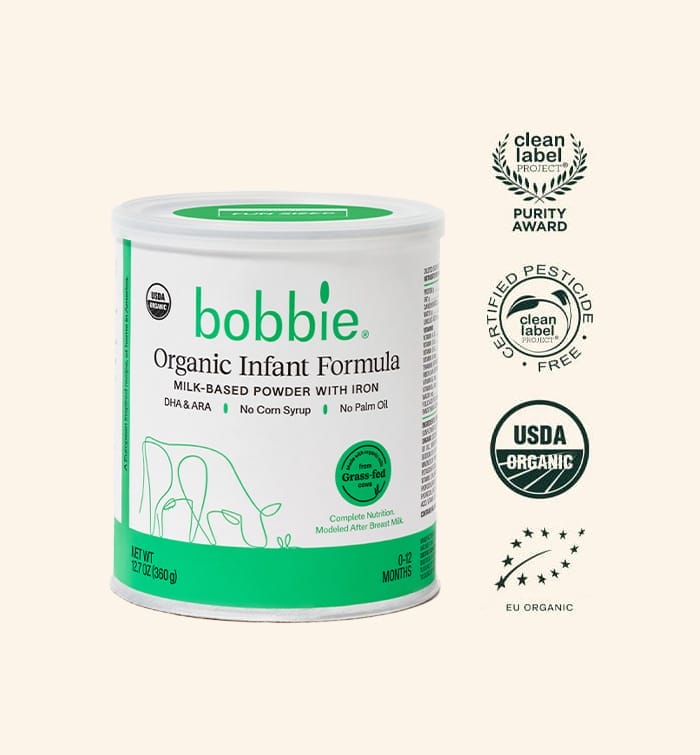We are proud to say that these posts are not sponsored. Our editorial team of Bobbie moms and writers personally select each featured product. If you buy something through our links, we may earn an affiliate commission, at no cost to you.
Every parent knows that the key to a happy and healthy baby is keeping them well-fed. Just like Goldilocks, you don’t want to feed your baby too much or too little—the amount of formula they’re given should be just right.
While babies will certainly tell you when they’re hungry, it’s important to understand their hunger cues and know how much organic infant formula to prepare. This article will help you determine how much formula your baby needs to thrive throughout their first year.
- Is There a One-Size-Fits-All Schedule for Feeding?
- What are General Formula Feeding Guidelines?
- Are There Differences In Feeding Times Between Formula and Breast Milk?
- When Is a Good Time to Feed Your Baby Formula?
- Why Does Your Baby Seem Hungrier All of a Sudden?
- How Can You Tell If Your Baby Is Eating Enough?
- Are Regular Feeding Changes Normal?
Is There a One-Size-Fits-All Schedule for Feeding?
Before we dive into the details, let’s make one thing clear: everyone’s baby is different, and that’s okay!
Your baby may eat more or less than general guidelines suggest. Above all, you need to listen to your baby and stay away from extremes. Formula feeding recommendations can be great benchmarks— just try not to worry too much if your formula-fed newborn or baby doesn’t follow them exactly.
What are General Formula Feeding Guidelines?
Several organizations provide basic trends and guidelines supported by the American Academy of Pediatrics (AAP) when it comes to formula feeding.
A basic rule of thumb is that most infants under six months of age who only eat formula or breast milk will usually consume between two and two and a half ounces of formula per pound of bodyweight every day.
For instance, if your baby weighs 10 pounds, they would eat between twenty and twenty-five ounces of formula. This translates to about one and a half to two ounces of formula every two hours within a weekly schedule.
Below, you’ll find the AAP’s guidelines for newborns, two months to four-month-olds, and infants six months or older. Remember: these are only general benchmarks, not hard-and-fast rules. Your baby knows their formula needs better than anyone else. Talk to your pediatrician if you have any questions or concerns.

Shop Bobbie Organic Infant Formula
Bobbie Organic Infant Formula is a USDA Organic, EU-style infant formula that meets all FDA requirements. It is a complete nutrition milk-based powder modeled after breast milk and is easy on tummies. It is non-GMO and doesn't have corn syrup, palm oil, or maltodextrin. Learn more about Bobbie.
How Much Does a Newborn Eat?
Most newborns have pretty small stomachs. Many are even smaller than your fist!
Naturally, this means infant formula or breast milk feedings will be pretty slow going at first. Most newborns eat about one to three ounces every two to three hours.
How Much Does a Baby eat at Two Months to Four Months?
As babies get older and their stomach gets larger, the amount of formula a baby needs changes. You may need to add an ounce or so every bottle-feeding session.
At two to three months old, most babies weigh eleven to twelve pounds, so you can expect an increased appetite around this milestone.
By two months, babies will do most of their eating daily— around four to five ounces every three to four hours. When they get closer to the three to four-month mark, four to six ounces per feeding is quite normal.
How Much Does a Baby Eat at Six Months and Older?
After six months, most parents start to add solid food to their baby’s diet like cereals, yogurt, soft cheese, and pureed vegetables. Because of this, your baby’s formula needs may start to decrease. The more solids they eat, the less formula intake they require.
By six months, your formula-fed baby is probably eating between six and eight ounces of formula every four to six hours.
While these guidelines are a safe general recommendation for the amount of formula your baby should be eating, differences between formula and breast milk, developmental milestones, and individual feeding cues will affect the right amount of formula a baby truly needs.
Are There Differences In Feeding Times Between Formula and Breast Milk?
There may be some differences in best formula feeding and breastfeeding practices, but only in your baby’s first few months. Because formula has a slightly different consistency than breast milk, it can be a bit more filling. This is especially true for newborns.
Although your formula-fed baby might consume fewer ounces than a breastfed baby, this doesn’t speak to any lack of nutrition. Formula is a nutritious alternative as a food source. Every formula sold in the US is regulated by the US FDA.
On the other hand, breast milk is digested in a baby’s stomach more quickly than most types of infant formula. As a result, little ones tend to be hungrier more often on a breast milk-only diet.
If you only use formula, you may benefit from longer waits between feeding sessions during your infant’s first months. However, this difference in frequency will even out once your baby is a few months old.
Ultimately, there isn’t much of a difference between breast milk and formula feeding needs, and many parents choose to feed their little ones a combination of both. Combo feeding can be done with mostly breast milk, mostly formula or any combination of the two that works for your family.
When Is a Good Time to Feed Your Baby Formula?
While the general guidelines listed above can give you a good idea of what to expect, you should feed your baby whenever they ask.
This seems like a simple answer, but it’s true— this process is called feeding on demand. Babies feed based on their own metrics rather than a clock, and they often use their cries to indicate hunger. Rest assured that it’s fine to feed your newborns whenever they cry from hunger. However, your newborn will develop a more routine feeding schedule as they grow.
This may not coincide perfectly with your mealtimes at first, but it’s possible to train your little one as early as a few months old by providing formula whenever you sit down to eat.
Why Does Your Baby Seem Hungrier All of a Sudden?
Increases in a baby’s appetite are completely natural. Babies will cry for food more often in the beginning because they only feel satisfied for a couple of hours at a time.
Not only will your baby’s stomach grow over time, but your baby may also experience a growth spurt that makes them hungrier for breast or formula milk. This is especially common at the three-, six-, and nine-month marks. During growth spurts, your baby may need extra nutrition to keep up with the changes their body is going through.
Many infants go through growth spurts at regular intervals, so don’t be surprised if these periods of increased hunger pop up again and again. Some mothers report growth spurts as early as the first week after birth.
Remember, don’t worry too much if your baby doesn’t have growth spurts around the timeframes discussed above— your child is an individual. Each baby’s weight gain and growth spurts will come when the time is right.
How Can You Tell If Your Baby Is Eating Enough?
Sometimes, you may worry whether your baby is getting enough formula. Changes in diet like introducing solid foods will affect the formula amounts they need in a 24-hour period, but it’s hard to know if your baby is eating enough overall.
If you’re feeding your baby whenever they’re showing signs of hunger, they’re probably eating enough. Most babies show clear hunger cues and don’t hesitate to tell you when they want to fill their tummy.
Still, babies grow at different rates, which is why regular checkups with your pediatrician are a good idea during the first year. Your doctor can measure your baby and ensure that they’re developing properly, easing any concerns about whether they’re getting enough formula or consuming enough vitamins and minerals.
Overall, you should only worry about whether your baby is eating enough if they don’t seem to gain weight after a period of time. It may also be cause for concern if they don’t seem very satisfied, even after you feed them.
These could be signs that your baby isn’t receiving enough nutrition from their formula. If you suspect this is the case, seek guidance from a trusted pediatrician.
Are Regular Feeding Changes Normal?
Regular feeding changes are absolutely normal.
Every parent will experience days when their babies don’t want to eat a lot and periods where they can’t seem to get enough. The good news is that most infant formulas are easy to prepare, so you can usually whip up a new batch within two to three minutes. It’s good preparation and storage practice to make fresh formula for every feeding.
You can also make a fresh batch and refrigerate it, but always discard unused formula after 24 hours. Once you begin feeding, the leftover formula should never sit out or be refrigerated for later use—remember to discard all leftover formula.
While your baby’s needs will fluctuate, they will eventually settle into a general eating schedule that you can anticipate over time.
Summary
How much formula your baby should eat depends on their unique feeding requirements. Typically, we recommend feeding on demand, which means feeding your baby when they are hungry.
You can avoid overfeeding or underfeeding by using the general guidelines provided in this article. Try to track your newborn’s feeding schedule as they get older and adjust accordingly.

Shop Bobbie Organic Infant Formula
Bobbie Organic Infant Formula is a USDA Organic, EU-style infant formula that meets all FDA requirements. It is a complete nutrition milk-based powder modeled after breast milk and is easy on tummies. It is non-GMO and doesn't have corn syrup, palm oil, or maltodextrin. Learn more about Bobbie.
Sources
Recommended Feeding Guide for the First Year | Hopkins Medicine
How to Prepare Powdered Infant Formula in Care Settings | World Health Organization (WHO)

